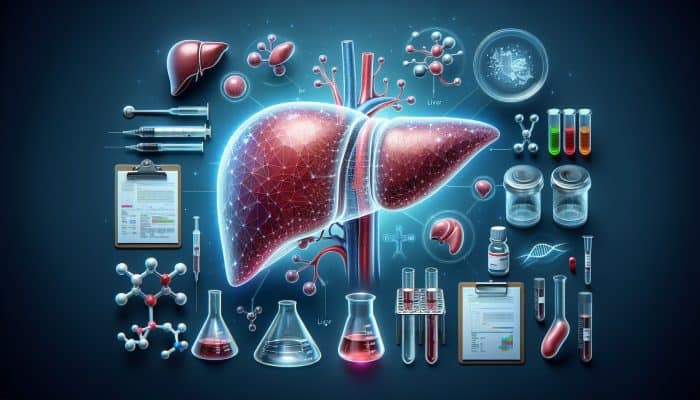Explore the Vital Importance of Liver Blood Tests for Comprehensive Health Monitoring
Discover the Key Functions and Benefits of Liver Blood Tests

Liver blood tests serve as essential diagnostic instruments that meticulously examine a variety of enzymes and proteins circulating within the bloodstream. These assessments enable healthcare professionals to gauge the overall health and functional capacity of the liver. Their significance cannot be overstated, as they are fundamental for the identification of various types of liver diseases, tracking the progression of existing conditions, and evaluating how well the liver responds to treatment strategies. The liver itself performs a multitude of vital functions, including detoxification, protein synthesis, and the production of crucial biochemicals necessary for effective digestion. Thus, understanding the liver’s functionality through thorough blood tests is paramount for sustaining optimal health and well-being.
A standard liver blood test panel typically encompasses a range of specific evaluations, including:
- Alanine Aminotransferase (ALT)
- Aspartate Aminotransferase (AST)
- Alkaline Phosphatase (ALP)
- Bilirubin
- Albumin
- Prothrombin Time (PT)
- Lactate Dehydrogenase (LDH)
- Gamma-Glutamyl Transferase (GGT)
Collectively, these tests furnish a comprehensive analysis of liver functionality, enabling the detection of any irregularities that could signal potential liver health issues.
The Critical Importance of Regular Liver Blood Tests for Optimal Health
Engaging in regular liver blood tests is crucial for the early identification of liver-related concerns, facilitating prompt medical intervention and treatment when warranted. Detecting abnormalities at an early stage significantly increases the chances of effectively managing liver diseases, which can span from relatively benign conditions to severe, life-threatening disorders. Individuals at heightened risk, such as those grappling with obesity, those who consume excessive alcohol, or those with a familial predisposition to liver diseases, should prioritise regular testing as a proactive measure for their health.
The significance of these assessments is amplified by their capacity to monitor liver functionality over time. For example, if a patient exhibits elevated liver enzyme levels, healthcare providers can track fluctuations in these levels to evaluate the effectiveness of lifestyle changes or medical treatments. Moreover, liver blood tests empower patients to make informed health decisions, underscoring the necessity of lifestyle modifications aimed at fostering liver health.
Determining the Ideal Frequency for Liver Blood Tests
The suggested frequency for liver blood tests can vary considerably depending on individual health circumstances and associated risk factors. Generally, individuals at a greater risk for liver disease, including those with a history of heavy alcohol consumption or pre-existing liver conditions, may require more frequent evaluations. In contrast, those without significant risk factors may only need testing every few years.
Your General Practitioner (GP) will provide tailored advice based on your medical history, lifestyle choices, and any underlying health issues. Regular consultations with your GP can help establish a personalised testing schedule, ensuring consistent and effective monitoring of liver health.
Expert Perspectives on the Significance of Liver Blood Tests in Hertford

Local Medical Experts' Recommendations for Liver Blood Tests
Healthcare professionals in Hertford strongly endorse routine liver blood tests as a fundamental element of comprehensive health assessments, particularly for individuals with recognised risk factors, such as obesity or a history of excessive alcohol intake. Local medical experts have observed significant benefits arising from early detection through these tests, often leading to timely interventions that can avert further liver damage and complications.
Consider a case study involving a patient from Hertford with a background of heavy alcohol consumption. During a standard health check-up, a liver blood test revealed elevated liver enzyme levels. This critical finding prompted immediate lifestyle adjustments and medical treatment. Such a proactive approach not only facilitated the early identification of potential liver disease but also empowered the patient to make informed choices about their health and lifestyle.
Preparing Effectively for Your Liver Blood Test
Preparation for a liver blood test typically necessitates fasting for several hours prior to the procedure, usually spanning 8 to 12 hours, to guarantee precise results. Adhering to your GP’s specific guidelines is essential, as different tests may entail various preparatory requirements. Besides fasting, it is crucial to inform your GP about any medications or supplements you may be taking, as these could influence the test results.
Maintaining adequate hydration during this period is also vital, as sufficient water intake can facilitate the blood draw for the healthcare professional. Thoughtful preparation can significantly impact the accuracy of the tests, ensuring that any required medical interventions can be effectively determined based on the results obtained.
What to Expect During Your Liver Blood Test Procedure

When undergoing a liver blood test in Hertford, a qualified healthcare professional will draw a small amount of blood from a vein in your arm. The procedure is typically swift and causes minimal discomfort, often described as a slight pinch. Most patients can expect the entire process to take less than 10 minutes, conducted by trained personnel who adhere to strict standards of care and hygiene.
Following the blood draw, the sample will be dispatched to a laboratory for thorough analysis. Patients usually receive their results within a few days, depending on the specific tests performed. This promptness facilitates timely discussions between patients and healthcare providers regarding the results and any necessary follow-up actions, leading to informed medical decision-making.
Accessing Liver Blood Tests in Hertford: Your Options
In Hertford, residents can easily obtain liver blood tests at various medical facilities, including GP surgeries and private clinics. Your healthcare provider can recommend the most suitable location based on your health requirements and personal preferences. Many GP practices in Hertford integrate these tests into their routine healthcare offerings, providing convenience for local residents seeking essential screenings.
For individuals in search of rapid results or more flexible appointment options, private clinics present a viable alternative. These establishments typically offer a range of services, including comprehensive liver assessments, and may even permit same-day appointments. Your GP can assist you in navigating the process of accessing these services to ensure you receive the most appropriate care.
Understanding the Analysis and Interpretation of Liver Blood Test Results
The analysis and interpretation of liver blood test results can be intricate, as it requires comparing the levels of various enzymes and proteins against established normal ranges. Elevated levels of enzymes such as ALT and AST may indicate liver damage or inflammation. Your GP in Hertford will provide a comprehensive explanation of your results, discussing what specific enzyme levels may suggest about your liver health and whether additional tests or interventions are necessary.
It is important to understand that abnormal results do not automatically signify liver disease; they may also arise from a variety of factors, including medications, infections, or metabolic disorders. Your GP will thoroughly review any abnormal findings, helping you comprehend their implications and the appropriate next steps, which may involve lifestyle changes, further testing, or referrals to specialists for more detailed evaluation.
Interpreting Liver Blood Test Results for Enhanced Health Outcomes
Evaluating Your Liver Blood Test Results: A Comprehensive Approach
Interpreting liver blood test results necessitates a nuanced understanding, as it involves comparing enzyme and protein levels against established normal ranges. For instance, elevated levels of alanine aminotransferase (ALT) and aspartate aminotransferase (AST) may signify liver inflammation or damage. Your GP in Hertford plays a crucial role in clarifying these results, ensuring that you grasp what the numbers represent within the broader context of your health.
Grasping your results is essential, as normal ranges may exhibit slight discrepancies between laboratories; therefore, your GP will interpret your results accordingly. If any values are elevated or outside the normal range, your GP will discuss potential next steps, which may include additional testing or lifestyle modifications aimed at enhancing liver health. This comprehensive interpretation process promotes patient understanding and engagement in their health journey.
What Abnormal Liver Blood Test Results May Indicate
Abnormal liver blood test results can point to a spectrum of liver conditions, ranging from mild inflammation to more severe diseases such as hepatitis or cirrhosis. For instance, persistently elevated levels of ALT and AST could suggest ongoing liver injury, while heightened bilirubin levels may indicate complications related to bile production or liver functionality.
Your GP will provide insights into the implications of specific abnormal results tailored to your situation, often considering additional medical history, symptoms, and risk factors. In many cases, further testing will be necessary to confirm a diagnosis and develop an appropriate treatment plan. Such assessments might include imaging studies like ultrasounds, MRIs, or even liver biopsies, should they be required for accurate diagnosis.
Managing Abnormal Liver Blood Test Results: Your Next Steps
Addressing abnormal liver blood test results typically begins with an in-depth discussion with your GP in Hertford. Based on the nature and severity of the abnormalities, your GP may recommend various strategies for managing your liver health. This could involve lifestyle modifications, such as adopting a healthier diet, increasing physical activity levels, or reducing alcohol consumption.
If necessary, your GP may suggest additional testing to determine the underlying cause of the abnormal results. For instance, if liver enzymes remain elevated, your GP might refer you to a specialist for a more focused evaluation and treatment plan. It is essential to remain proactive and engaged in discussions with your healthcare provider to ensure effective management of your liver health.
Commonly Performed Liver Blood Tests and Their Significance
Standard liver blood tests included in routine panels are designed to assess liver functionality and identify potential liver diseases. Key tests consist of:
- Alanine Aminotransferase (ALT): Elevated levels may indicate liver inflammation or damage.
- Aspartate Aminotransferase (AST): Generally assessed alongside ALT to gauge liver health.
- Alkaline Phosphatase (ALP): Aids in evaluating bile duct obstruction or liver disease.
- Bilirubin: Assesses the liver’s ability to process waste; elevated levels can signify liver dysfunction.
- Albumin: Low levels may suggest chronic liver disease or liver failure.
- Prothrombin Time (PT): Evaluates blood clotting function in relation to liver health.
- Lactate Dehydrogenase (LDH): Elevated levels may indicate tissue damage, including liver injury.
- Gamma-Glutamyl Transferase (GGT): Increased levels can suggest liver disease or alcohol use.
These tests provide a detailed overview of liver health, enabling healthcare providers to identify any issues that may warrant further investigation or intervention.
How to Access Liver Blood Tests in Hertford: A Comprehensive Guide
Clinics in Hertford Offering Liver Blood Tests
In Hertford, numerous clinics and GP surgeries are equipped to provide liver blood tests as part of their routine health services. Many local GP practices actively promote regular health screenings, especially for individuals identified as having risk factors for liver disease.
In addition, several private clinics offer liver blood tests, often with the benefit of quicker results. Some of these facilities may require a referral from your GP, while others allow for direct appointments. As a Hertford resident, you have multiple options for obtaining liver blood tests, making it easier to prioritise your health.
Exploring Private Healthcare Options for Liver Blood Testing
Indeed, private healthcare providers in Hertford offer liver blood tests, which can be particularly attractive for individuals seeking rapid results or more convenient appointment scheduling. Private clinics generally provide a wide array of health services, including comprehensive liver evaluations, and may allow patients to book appointments directly, often without needing referrals.
Some notable private healthcare facilities offering liver blood tests in Hertford include:
- Hertford Health Centre
- Private Medical Clinic Hertford
- Health Plus Clinics
- Hertford Diagnostic Centre
These establishments typically provide streamlined services, enabling patients to receive their results promptly and discuss any necessary follow-up steps with healthcare professionals.
The Booking Process for Liver Blood Tests in Hertford
Booking a liver blood test in Hertford can be achieved through your GP or directly with private healthcare providers. If you choose to go through your GP, they will likely assist you in navigating the process, including scheduling an appointment for the test and providing any necessary preparatory instructions.
For those preferring private care, many clinics in Hertford offer online booking systems, simplifying the appointment scheduling process at your convenience. Some facilities may also provide walk-in services, enabling you to undergo a liver blood test without a prior appointment. Regardless of the option you select, early booking is advisable to secure your preferred time slot.
What to Expect During Your Liver Blood Test in Hertford
Upon arriving for a liver blood test in Hertford, you can anticipate a straightforward process that typically takes less than 10 minutes. A trained healthcare professional will draw a small amount of blood from a vein in your arm, a quick procedure that usually causes minimal discomfort.
It is crucial to remain calm throughout the process; the healthcare provider will guide you through each step, ensuring you feel comfortable and informed. After the blood draw, the sample will be sent to a laboratory for analysis, and you can expect to receive your results within a few days. This efficiency is vital for timely follow-up discussions regarding your liver health.
Evidence-Based Benefits of Liver Blood Testing in Hertford
Enhancing Health Outcomes Through Early Detection
Early detection of liver-related issues through blood tests can greatly improve treatment outcomes and prevent further liver damage. Numerous studies indicate that individuals diagnosed with liver conditions at earlier stages enjoy better prognoses and a higher likelihood of successful management.
Upon receiving liver blood test results, individuals can take proactive steps. For instance, if elevated liver enzymes are detected, patients may benefit from lifestyle modifications, such as adopting a healthier diet, reducing alcohol consumption, or increasing physical activity levels. Regular monitoring through follow-up tests can help evaluate the effectiveness of these changes and guide subsequent actions, empowering patients to take control of their liver health.
How Liver Blood Tests Enhance Overall Health Outcomes
Liver blood tests are instrumental in assessing the effectiveness of treatments for liver conditions. By conducting regular evaluations, healthcare providers can determine whether a treatment plan is yielding results or if adjustments are necessary. This ongoing assessment helps ensure that patients receive the most effective care tailored to their unique health requirements.
Additionally, these tests can provide valuable insights into the progression of liver disease, enabling timely interventions that can enhance health outcomes. For instance, if liver function deteriorates, healthcare professionals can explore alternative treatments or therapies to mitigate further damage, ultimately improving the patient’s quality of life.
Research Supporting the Importance of Liver Blood Testing
Numerous research studies underscore the significance of liver blood testing in diagnosing and managing liver diseases. Research conducted by various UK institutions highlights the necessity of regular screening, particularly for at-risk populations, and illustrates how early detection can lead to improved health outcomes.
For example, studies have shown that individuals with a history of liver disease who undergo routine testing are more likely to access early interventions, resulting in better management of their conditions. This evidence reinforces the need for proactive healthcare measures and the crucial role that liver blood tests play in safeguarding liver health.
The Impact of Lifestyle Choices on Liver Health
Exploring the Connection Between Diet and Liver Health
Diet plays a fundamental role in maintaining liver health, with certain foods actively supporting liver functionality while others can exacerbate liver disease. A balanced diet rich in fruits, vegetables, whole grains, and lean proteins is essential for optimal liver performance. Steering clear of excessive fats, sugars, and processed foods is critical for preventing liver damage and promoting overall wellness.
Specific dietary recommendations for enhancing liver health include:
- Incorporating leafy greens like spinach and kale
- Choosing whole grains over refined options
- Consuming lean protein sources such as chicken, fish, and legumes
- Limiting saturated fats and sugars
- Staying well-hydrated with plenty of water
- Including nuts and seeds for healthy fats
- Adding antioxidant-rich foods like berries and citrus fruits
- Avoiding excessive salt intake
These dietary choices can significantly influence liver functionality, aiding in the prevention of liver diseases and promoting overall health and well-being.
The Detrimental Effects of Alcohol on Liver Health
Excessive alcohol consumption is a leading contributor to liver disease, including fatty liver disease, alcoholic hepatitis, and cirrhosis. The liver is responsible for metabolising alcohol, and excessive intake can overwhelm this process, leading to inflammation and damage over time.
Limiting alcohol consumption is crucial for protecting liver health. For individuals at risk of liver disease or those with existing liver conditions, abstaining from alcohol can substantially improve liver function and decrease the likelihood of complications. Understanding the effects of alcohol on liver health is essential for making informed lifestyle choices that support long-term well-being.
The Benefits of Regular Exercise for Liver Health
Engaging in regular physical activity is beneficial not just for overall health but also specifically for liver health. Exercise helps maintain a healthy weight, which is vital for preventing conditions such as fatty liver disease. Additionally, physical activity can enhance insulin sensitivity and reduce liver fat, thereby further supporting liver function.
Participating in at least 150 minutes of moderate-intensity aerobic exercise weekly can lead to substantial improvements in liver health. Activities like brisk walking, cycling, or swimming can effectively lower the risk of liver disease and promote overall metabolic health. Incorporating strength training exercises can also be advantageous, aiding in muscle mass development and enhancing body composition.
Community Initiatives Supporting Liver Health in Hertford
Promoting Liver Blood Tests in the Hertford Community
Public health campaigns in Hertford frequently focus on raising awareness about the importance of liver blood tests, particularly during designated national health observance months. These initiatives aim to educate the public on liver health and the significance of regular testing, especially for individuals at risk for liver disease.
Local healthcare providers and community organisations often collaborate to disseminate information regarding liver health, providing resources and guidance for those interested in undergoing testing. Engaging the community through events, workshops, and informational sessions fosters a culture of proactive health management, encouraging individuals to prioritise their liver health.
Public Health Initiatives Focused on Liver Health Promotion
In Hertford, various public health initiatives target liver health, including complimentary health screenings and educational workshops designed to enhance awareness. These programmes aim to inform residents about the risks associated with liver disease and advocate for preventive measures such as regular liver blood testing.
Providing free screenings can significantly increase community participation, allowing individuals to access essential health services they might otherwise overlook. Workshops often feature expert-led discussions, equipping attendees with valuable insights into liver health, disease prevention strategies, and the importance of early detection through testing.
Supporting Liver Health Initiatives in the Hertford Community
Community support for liver health in Hertford encompasses various initiatives, including health fairs, fundraising events, and awareness campaigns. Participation in these activities not only raises awareness about liver health but also encourages residents to engage in preventive measures, such as regular liver blood testing.
Local communities can promote liver health by advocating for healthy lifestyle choices, including balanced diets and regular exercise. Distributing informative materials and hosting events focusing on liver health education can further empower residents to take charge of their well-being. Collectively, these efforts can contribute to fostering a healthier community, reducing the incidence of liver diseases, and enhancing overall public health outcomes.
Frequently Asked Questions About Liver Blood Tests
What is the purpose of a liver blood test?
A liver blood test evaluates various enzymes and proteins present in the blood to assess the health and functionality of the liver, aiding in the diagnosis of liver diseases or monitoring ongoing conditions.
How frequently should I undergo liver blood testing?
The frequency of liver blood tests is contingent upon individual health conditions and risk factors. Consult your GP to receive tailored recommendations based on your specific circumstances.
Where can I obtain a liver blood test in Hertford?
Liver blood tests are available at local GP surgeries, private clinics, and hospitals throughout Hertford. Speak with your healthcare provider for specific recommendations on where to go.
What actions should I take if my liver blood test results are abnormal?
If your liver blood test results return abnormal, it is crucial to consult your GP for a thorough interpretation and recommendations regarding lifestyle changes or further testing.
Is it permissible to consume alcohol before a liver blood test?
Generally, it is advisable to refrain from alcohol consumption for at least 24 hours prior to a liver blood test to ensure accurate results. Always follow your GP’s specific instructions for preparation.
What does an elevated ALT level signify?
An elevated level of ALT typically indicates liver inflammation or damage. Additional testing may be required to ascertain the underlying cause of the elevation.
What steps can I take to prepare for a liver blood test?
Preparing for a liver blood test usually involves fasting for 8 to 12 hours leading up to the test. Ensure you stay hydrated and discuss any medications with your GP in advance.
Are liver blood tests safe to perform?
Yes, liver blood tests are considered safe and minimally invasive. The blood draw is conducted by trained professionals, and the procedure typically results in little discomfort for the patient.
What lifestyle modifications can I implement to enhance liver health?
Adopting a balanced diet, engaging in regular exercise, maintaining a healthy weight, and limiting alcohol intake can all significantly improve liver health and overall well-being.
How long does it typically take to receive liver blood test results?
Liver blood test results are usually available within a few days, depending on the laboratory’s processing times. Your GP will discuss the results with you as soon as they become available.
Connect with us on Facebook!
This Article Was First Found On https://bloodtest.co.uk
The Article Liver Blood Test Guide: Essential Information for Hertford Residents Was Found On https://limitsofstrategy.com

